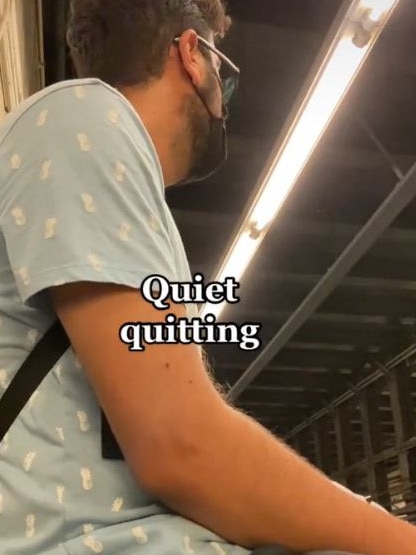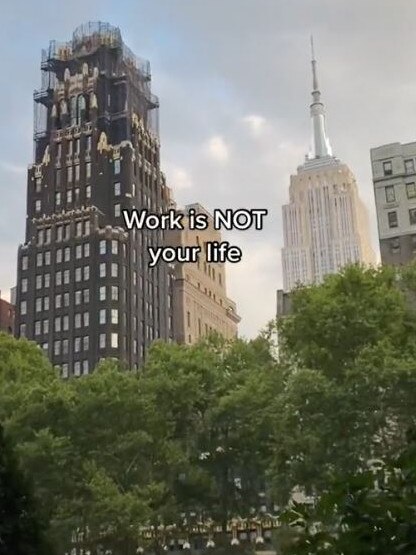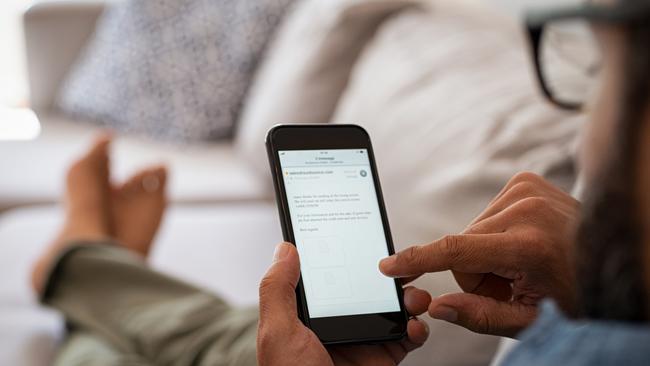Australian work culture behind as Europe leads the way in four-day working week
As other countries shuffle up their work culture to generate a healthy work-life balance, Australian employees are facing record-rates of burnout - so where did we go wrong?
Work
Don't miss out on the headlines from Work. Followed categories will be added to My News.
While European workplaces are instating laws to help give their employees a healthy work-life balance, almost half of all Australians are reporting signs of burnout off the back of a huge problem in Australia’s work culture.
According to the latest ELMO Employee Sentiment Index, cases of employee burnout are reaching record-highs with workers taking on additional responsibilities and overworking to blame.
Additionally, just over a third of Australians are working above the standard 38-hour week, with 10 per cent of those working more than 46 hours.
As a result, a new trend known as “quiet quitting” has emerged where employees are giving up on the idea of going above and beyond to create a more equal work-life balance.
“It’s not about quitting a job but instead taking action in not allowing work to take over your life,” Dr Jennifer Luke, a research fellow at the University of Southern Queensland, told news.com.au.
“Perform what is required in your work, set boundaries on what you do additionally in your role such as going “above and beyond” and remind yourself that your worth as a person is not defined by your labour.”


Behaviours associated with the trend include employees only doing projects within their job description, leaving work on time and not taking work calls or replying to emails after hours.
Some Australians partaking in this trend have admitted that it’s helped resolve their burnout and has improved their mental health both at work and at home.
“I have been doing this since 2021 after a burnout breakdown in 2020 and I encourage everyone to do the same!” one Facebook user posted.
“Doing less with more meaning has been way more rewarding than doing everything above and beyond for no thanks or appreciation.”
Meanwhile another Australian worker who has lived by the quiet quitting mindset said on Facebook: “I’ve been doing this my whole life. My mother taught me if you work for free (extra work for no pay) you are actually saying your work effort is worth nothing.”
A third couldn’t believe employees gave into doing work after hours.
“Why burn yourself out? Why take calls and emails after hours? I can’t believe people do this. Your health is number one and boundaries have to be put in place. Work is just a job, but you only have one life,” she said.

But as Australians come up with their own ways to avoid burnout in an attempt to distance their work life from their personal life, European countries have introduced laws to help generate a healthy work-life balance for workers.
Europe leading the way with work-life balance
For example, in France companies that have 50 employees or more are advised to refrain from contacting their staff outside standard working hours.
The law, also known as the Right to Disconnect amendment, came into effect in 2017 after studies revealed workers were finding it difficult to distance themselves from their job due to the digital age.
Enhanced communication technology made it easier for employers to reach their staff after work, which prevented workers from disconnecting from their work life while at home.
While businesses won’t be penalised if they breach the rule, it’s encouraged that workers are given an option to step away from their work after they’ve completed their hours.
It’s not the only perk French workers are entitled to. By simply being employed in the country, workers receive 30 days off a year and 16 weeks of paid family leave.
Meanwhile in Belgium, the country recently won its rights to a four-day working week in February this year.
Employees have the option to choose whether they want to condense their working hours into fewer days or stick to a five-day week. No matter which option, they’re still entitled to the same pay.
The United Kingdom is also two months into a six-month, four-day working week trial where workers are expected to follow the “100:80:100 model”. This means employees will receive 100 per cent of their pay for 80 per cent of the time, while staying 100 per cent committed to their job.

Scotland and Wales are also due to commence a similar trial in 2023, while a number of other countries outside Europe such as Japan and the United States are also considering jumping on the reduced working week bandwagon.
With multiple other countries shaking up their work culture in an attempt to generate a healthy work-life balance, it begs the question: are Australian workplaces falling behind?
Is Australia falling behind?
Australia has only recently jumped onto the four-day working week trend, with some companies taking part in not-for-profit advocacy group 4 Day Week Global’s initiative this month where businesses reduce the number of working days for their employees.
Another change as a result of the pandemic that has come into effect is the idea of flexible work, where employees are given the option to work from home for a few days a week. Unfortunately this isn’t an option for everyone however, as not everyone works in an office environment.
Dr Luke said a number of events, including the pandemic, in the past few years has generated high levels of stress and uncertainty, contributing to high burnout rates.
“Communication, transparency and clear structure within workplaces was always important and more so now,” Dr Luke said as 29 per cent of employees consider a career change.
As for ways to avoid burnout, Dr Luke said it’s important to know your work, opportunities and who you are as a person in order to stay mentally and physically healthy.
“One of the biggest hurdles in identifying what your values, passions and career goals are is simply having time to have the mental space to do so,” she said.
“Ask yourself what provides you meaningful work, purpose. Be aware of what is happening in your sector or where you want to move to, and consider how your skills, experience and values can already be transferable and valuable to employers.”
For those struggling to come to terms with what they want to do next in life or a struggling to find satisafcation in their work, Dr Luke recommends speaking to a careers counsellor.
“This current trend of “quiet quitting” is a good reason to have a career conversation with an experienced careers counsellor and practitioner to understand who you are, build on your adaptability and identify career opportunities,” she said.
Originally published as Australian work culture behind as Europe leads the way in four-day working week





